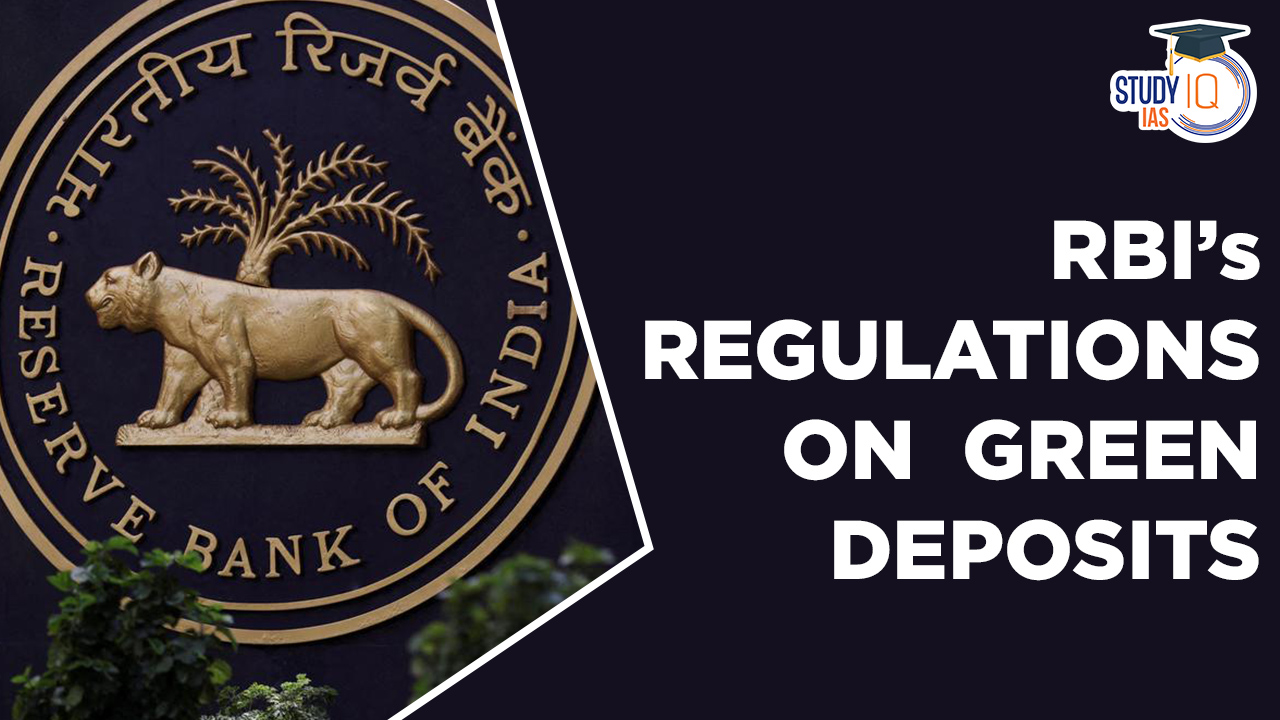Table of Contents
Context: A regulatory framework has been developed by RBI for banks to accept green deposits from customers.
What are Green Deposits?
- Green deposits are similar to regular deposits accepted by banks. The major difference with green deposits is that banks promises to earmark the money obtained through these deposits towards environmentally-friendly projects.
- Green deposit is one such product in a wide range of other financial products such as green bonds, green shares, etc., that puts investors’ money into environmentally sustainable projects.
- For example, a bank may promise to invest green deposit money towards financing renewable energy projects that tackle climate change or may also avoid investing the same money in fossil fuel projects that harm the climate.

RBI’s Regulatory Framework
- Applicability: RBI’s framework will apply to all scheduled commercial banks and small finance banks (except for regional rural banks and local area banks) and non-banking finance companies (including housing finance companies).
- Investment information: The banks accepting green deposits from customers will have to disclose more information on how they invest these deposits.
- Certain policies or rules: The bank accepting green deposits must come up with a set of rules or policies approved by their respective Boards that will have to be adhered while investing green deposits from customers.
- Disclosure of information: The green deposit rules need to be made public on the banks’ websites. Apart from disclosing how the amount is invested, the banks must also provide information on impact of such investments on the environment.
- Third-party verification: An independent third-party will have to verify the claims made by banks regarding the projects in which green deposit money has been invested. The sustainability credentials of such projects also need to be verified.
- Eligible sectors: RBI has provided a list of sectors that can be considered as sustainable and thus eligible to receive green deposits.
- Some of these sectors include renewable energy, clean transportation, energy efficiency, waste management, afforestation, management of living natural resources, and biodiversity conservation.
- Non-eligible sectors: Banks will not be allowed to invest green deposit money into business projects involving fossil fuels, nuclear power, gambling, palm oil, tobacco, and hydropower generation.
- Rupee denomination: The money deposited in green deposits will be denominated in rupees only. Money can be withdrawn after maturity.
Significance of RBI’s Guidelines
- Prevent greenwashing: The RBI’s guidelines will help prevent greenwashing, which refers to making misleading claims about the positive environmental impact of an activity.
- Prevent investments on high-return projects: Without RBI’s guidelines, banks may be tempted to invest green deposit money in high-return projects, which are not environmentally friendly.
- Transparency: The depositor will know how his/her money under green deposits is being invested. This will encourage more such investors to join the scheme.
- Promote green financing: The RBI’s framework on green deposits provides an opportunity to promote green financing in India, which is yet to be developed fully.
Benefits of Green Deposits
- For depositor:
- Moral satisfaction: Depositors who care for environment may get some satisfaction from investing their money in environmentally sustainable investment projects, thus contributing for environment.
- Environmentally friendly good returns: Green deposits provide good returns while being environmentally-friendly.
- For environment:
- Environmental funding: Projects that have net positive impacts on environment will be promoted through green deposits. Such projects need not struggle to get funding.
- Balancing development and environment protection: Existing developmental projects will be balanced by environmentally sustainable projects through green deposits.
Drawbacks of Green Deposits
- Feel-good scam: Many experts argue that a green deposit is a way to make investors feel good about themselves as their investments don’t do much good to the environment.
- Difficult to ascertain sustainability: There are other second-order effects of an action, and it will be extremely difficult to know if a project is completely environmentally sustainable.
- Long-term returns: For banks, the returns on green projects will be long-term. In short term, they have very little scope for high profits.


 Bharat Bandh 9 July 2025: Over 25 Crore ...
Bharat Bandh 9 July 2025: Over 25 Crore ...
 Mukhyamantri Majhi Ladki Bahin Yojana, O...
Mukhyamantri Majhi Ladki Bahin Yojana, O...
 Nipah Virus (NiV): Structure, Testing Me...
Nipah Virus (NiV): Structure, Testing Me...





















